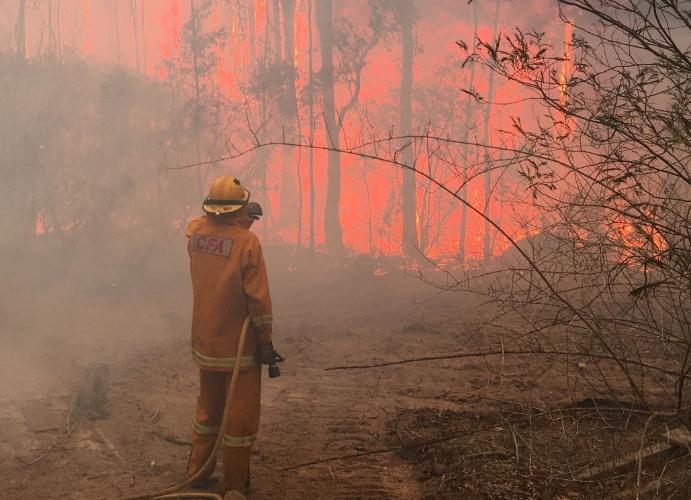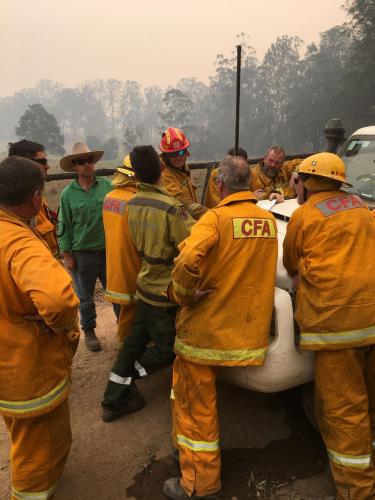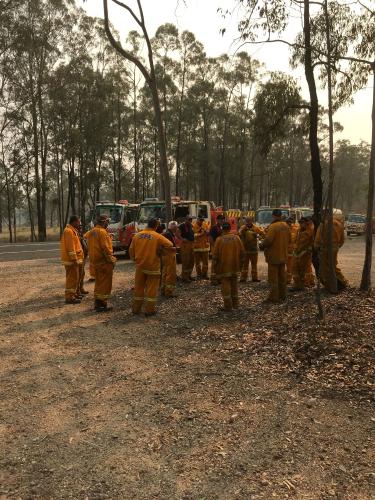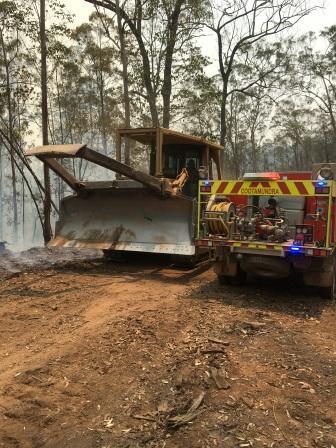Summer 2019-20, the worst bushfire season in history. By truck, airplane and helicopter, from all over our nation, they come to the firegrounds in the south eastern states of Australia, as the country battles through a national emergency.

Trained volunteer firefighters from regional areas form into self-contained strike teams with their own command structure, somewhat like the size and function of an army platoon, but very short lived. Most strike teams work together for no more than a week before heading home.
Strike teams represent the front line of attack in fighting big grass and bushfires. They are the massed ground troops, the infantry.
A strike team comprises enough trained operatives to crew four or five tankers and a command vehicle - between 20 and 30 people - and is in action day and night, doing whatever has to be done to contain an out-of-control force of nature.
Heading up the highway on a chartered bus with a load of strangers - for team members are often drawn from far and wide and many don’t know each other - moving towards a danger zone that people are fleeing from, carrying some expectation of threat to life and limb. All this high drama invariably leads to striking a wartime analogy, because nothing in civilian life comes as close to offering the experience of military combat as a big campaign fire, and troops muster their courage for battle with the flames, wielding their hoses like weapons, their trucks like tanks.
And fire lends itself well to the role of mortal enemy. It is unpredictable, powerful, merciless, and fights to the death.
CFA grew out of the farming soil of Victoria by necessity, to protect that soil, the income-producing herbivores that live on it, the crops, the houses and people. Fighting fires was not a vocation to farmers and graziers, it was an unwelcome interference in the ordinary course of life on the land. There were always more important, more necessary, and less dangerous tasks to attend to than losing hours or days on the back of a fire truck in the smoke and heat and flames of summer.
On the bus we live in an extroverted world where humour is the great leavening agent, and to take yourself at all seriously, or too lightly, is to risk ending up on the outer edges of this instant pop-up society. But not excluded. We are a team and know the importance of retaining group cohesiveness. We have to rely on each other, for when danger threatens each individual plays an important role in ensuring the safety of the entire crew.

Who knows where we will end up this time? The briefing is often sketchy and last-minute changes do happen. This adds to the anticipation and building excitement as radio and internet reports come in warning of increasing threat levels, property and stock losses, people unaccounted for, and worst of all the deaths - the poor souls who’ve perished in the horrendous circumstances we as firefighters are only too well aware of.
A motel on the edge of a town encircled by fire is a prime billet, hands-down beating a tent on the footy oval with portable showers and toilets. The buffet breakfast in the local riverside RSL could not be bettered in a capital city hotel. There are beers around the pool the first night as fruit bats circle the tall palms overhead. These are some of the fringe benefits of volunteering. There are many others.
To have the opportunity to see new country, explore rarely seen wilderness on freshly made dozer tracks, drive over broad farming acres only travelled by its owners, and view the trees and vegetation and fauna so different from home, is a particular privilege for any countryman who admires landscapes and nature.
The next day we are tasked at the incident control centre, a busy hive of disciplined activity. We are briefed on the lay of the land where we are headed, warned of hazards, receive vitally important weather forecasts, radio frequencies, and given individual document packages containing maps, protocols, guidelines. We collect water, lunch packs and ice and are directed to our trucks parked in the staging ground, an open area where operational vehicles are lined up in strike team order.
This is when the crew comes together, when a disparate group of individuals forms a team, takes possession of a tanker and learns its tricks, checks its equipment lockers, familiarises themselves with every operational element of the new vehicle, a vehicle branded with its brigade of origin in letters along the side, having an identity and associations, the local fire tanker. Cootamundra? Don Bradman’s birthplace.
Every tanker, every brigade is a potent symbol of the town or district it represents and protects. Now with a tanker to control and work from we have agency, a means of service delivery, an operating platform, and can begin what we are trained to do.

The strike team leader heads out in the 4WD ute and the tankers follow onto the unfamiliar roads and terrain shrouded in smoke from the surrounding out-of-control fires burning on crown land and in state parks, up in the high country we look out at.
We are patrolling for spot fires, breached containment lines, properties at risk and also assuring the local community we are around and available to assist in their time of peril. We turn into farms, moving up their access tracks, to the house. Some are empty, others look so until a figure appears at a doorway and comes out to chat, usually showing a brave face. It takes courage to stay alone in the path of an uncontrolled fire, but there other possible explanations and we encounter both stubbornness and stupidity among some folk who live in the hinterland of this coastal paradise.
In the afternoon we are assigned to back burning operations high in the elevated country overlooking the town and the Pacific Ocean - assuming the smoke cleared to allow such a view. Kilometres of winding dirt roads must be lit up on foot with firelighters, and patrolled to make sure the flames do not climb trees and spot over the road into the unburnt forest that is hoped will be a buffer between the fire front and settled country.
It is slow, tedious work in the heat of the day with an element of danger from previously burnt roadside trees coming down over the truck and falling giants can be heard exploding as they hit the ground deeper in the forest. Those that do come across the road require chainsawing so we can get out and back in next time. The thought is the same for all. We could have been under one of those.
Days pass with more back burning, chasing up reports of breakaways and blacking out fire edges. Other crews save houses from destruction. On a steep mountain dozer trail while making our way out to the road, the fire front appears from the valley to our right and starts racing uphill towards us, crossing our path at the ridge top and flaming into our side before quickly dying from lack of fuel. The mineral earth break had done its job.
On our last night we enjoy a splendid dinner at the RSL, are thanked profusely by many locals and on the full airplane next day heading south the captain announces a Victorian strike team is aboard and the cabin breaks out in clapping. Free beers are served.

The ancient Greek ethical philosophy of eudaimonism essentially states that a happy spirit is reached through virtue, and ‘virtue brings its own reward’ is a well-used quote from John Henry Newman, a 19th century theologian. Volunteer firefighters, of course, come in all colours, shapes and sizes and not all are necessarily purely or even partly motivated by virtue. Most I suspect, like myself, offer their time from a mixture of motives, much like our soldiers who go to war. And we are not all heroes. To say so devalues that virtue, spreads it around too thinly.
However, I’m sure that whatever our individual motivations are, all of us receive considerable acknowledgment and a rich sense of reward from putting ourselves out to assist our fellow Australians, from saving lives and property and from simply being of service to others in need.
Author: Tony Edney, Stoneleigh Fire Brigade